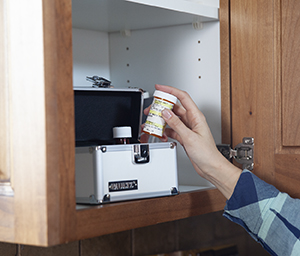Taking Opioid Medicine
For your health and safety, it’s important to take opioid medicine exactly as directed. This helps make sure it works as it should. It lowers the risk of side effects. It lowers the risk of taking too high a dose (overdose). Each opioid medicine is different and has its own directions for use. Your healthcare provider will explain what medicine you’re prescribed. They will tell you how to take it. If you have questions or concerns, talk with your healthcare provider.
Using opioid medicine safely
Opioid medicine can work well to ease pain. But taking too much, taking it too long, or not taking it the right way can be harmful. To help reduce the risks to your health, follow these safety tips:
-
Make sure you know if you should take the medicine on a regular basis or only as needed.
-
Tell all your healthcare providers and pharmacies about the medicines you're taking. This includes opioid medicine.
-
Ask your providers about the cautions and side effects to be aware of. Follow their directions.
-
If you should take the medicine on a regular basis, take it on time and at the right dose. If you miss a dose, don’t double up the next dose.
-
Use a medicine log, app, or calendar to keep track of when you take your medicine. This helps you stay on schedule and not miss doses or take extra doses.
-
When taking liquid doses, use a measuring spoon or dropper. This way you can be sure you take the correct dose.
-
Tell your healthcare provider if you have any side effects.
-
Don’t cut, crush, or change your medicine in any way.
-
Don’t take someone else’s opioid medicines. Don't or share yours with other people.
-
Don’t drive while taking opioid medicine.
-
Don’t use dangerous equipment or power tools while taking opioid medicine.
-
Check expiration dates regularly. Throw out any expired medicines correctly.
Beware of combining medicines
Some medicines can be dangerous when used with opioid medicine. In some cases, combining medicines can cause death. Make sure to tell your healthcare provider and pharmacist about all of the medicines you’re taking. This includes over-the-counter medicines. It includes vitamins, herbal remedies, and other supplements. And it includes illegal or street drugs. Medicines that may be unsafe to use with opioid medicine include:
-
Over-the-counter pain relievers, such as acetaminophen
-
Other prescription opioid medicine
-
Benzodiazepines, such as clonazepam or alprazolam
-
Muscle relaxants, such as cyclobenzaprine or carisoprodol
-
Hypnotics, such as sleep aids like zolpidem
Warning: Never take opioid medicine with alcohol or street drugs. This can cause death.
Symptoms of opioid overdose
Opioid medicine affects the part of the brain that controls breathing. An overdose of opioid medicine can slow breathing down too much. It can even stop your breathing. This can cause death. Call 911 right away if you think you or someone else has had an overdose.
Look for these 3 key symptoms:
-
The dark circles in the middle of the eyes are very small (pinpoint pupils)
-
Breathing is slowed or stopped
-
The person is not awake or aware and doesn't wake up (unconscious)
Other symptoms to look for include:
Naloxone for overdose
Naloxone is a medicine given to reverse the effects of an overdose. It's available without a prescription. Talk with your healthcare provider about the symptoms of overdose and having naloxone available. For more information about opioid overdose and naloxone, see the CDC website.
Storing opioid medicine safely
Opioid medicine needs to be stored safely. This helps protect anyone else from accidentally taking the medicine. It helps prevent the theft and misuse of the medicine. If possible, store the medicine in a locked container or cupboard that other people can't access. Store the medicine in a cool dry place. Don’t store it in a damp place, such as a bathroom. Always put the medicine back in its secure place after each use.

Disposing of opioid medicine
Dispose of unused or expired opioid medicine in a safe way. This is to prevent harm to other people. Don’t save your medicine or give it to other people for any reason. Even a single dose of opioid medicine can lead to death if it is used by someone else. To dispose of your medicine safely:
-
Find your community’s medicine take-back program. You may need to drop off the medicine at a local police station or pharmacy.
-
Ask your pharmacy about a mail-back program. You may be able to send the medicine through the mail. This is done using a special envelope.
If these choices are not available to you, ask your healthcare provider for help.
FDA guidelines for disposal
The FDA also has guidelines for disposing of medicines. You may be able to flush them down the toilet. Or you may be able to put them in the trash. Check with your local water and waste management company to see what is allowed in your city or state. You can learn more at the FDA website at www.fda.gov/consumers/consumer-updates/where-and-how-dispose-unused-medicines .
Stopping opioid medicine treatment
If you have been taking an opioid medicine for more than a few weeks, your body gets used to having it. When you stop taking the medicine, you can have withdrawal symptoms. There are many kinds of withdrawal symptoms. They can range from mild to severe. They can include:
Don’t stop opioid medicine without help from your healthcare provider. You will need a plan to safely stop taking it. This is to help manage withdrawal symptoms. In most cases, the amount of medicine you take will be cut down. You will take less and less over several weeks. If needed, you may need to take other medicines and treatments to help with this process. As the opioid medicine leaves your body, your body will adapt. Your withdrawal symptoms should then go away. How long this takes can vary for each person.